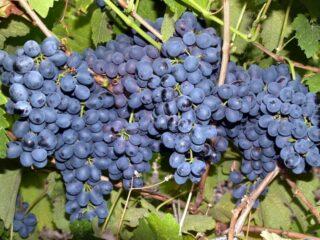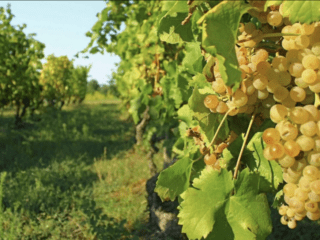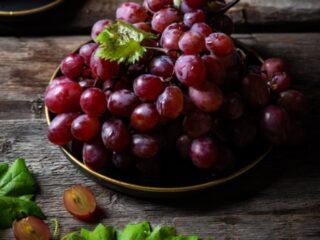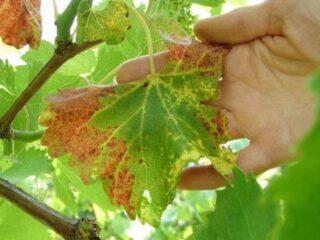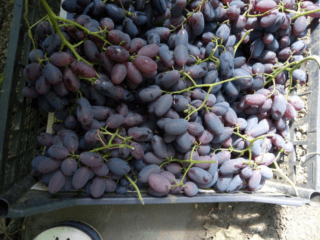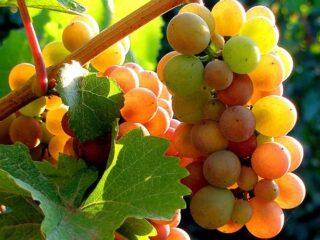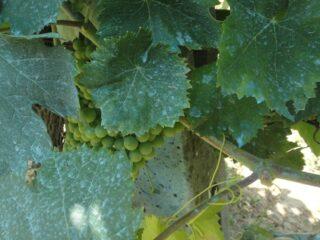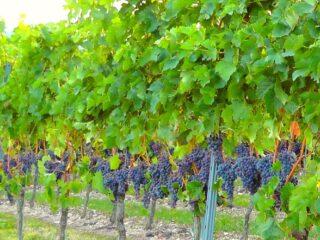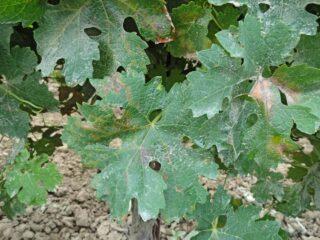Content
Spraying grapes with baking soda is an excellent alternative to pesticides and other chemicals. Treatment with sodium bicarbonate (bicarbonate) is used to treat and prevent a number of diseases characteristic of the crop, to get rid of weeds, and as fertilizing. Plants are sprayed with soda solutions in their pure form, in combination with other components.
Beneficial features
Many gardeners began to use baking soda, appreciating its benefits. The following properties are valuable in relation to grapes:
- increasing the sugar content of fruits;
- cultural rejuvenation;
- improving the taste of grapes;
- inhibition of weed growth;
- harmful effects on insect pests;
- reducing soil acidity;
- fungicidal effect - prevention and treatment in the initial stages of certain fungal infections.
What soda to use
Treat the grapes with regular soda labeled “baking soda.”The product is absolutely safe for crops, humans and animals. It is also harmless to pollen. Soda treatments are appropriate at any phase of the growing season, including before harvest.
In gardening, it is permissible to use a calcined product. It should be remembered that its solubility is worse, so it should only be poured into warm water.
Indications for use
Treating grapes with soda is appropriate in the fall, summer, and spring. The purposes of spraying are different:
- prevention of fungal infections - gray rot, powdery mildew, including downy mildew;
- treatment of the above problems at the initial stage;
- grape rejuvenation;
- destruction and repelling of insect pests;
- improving the taste of fruits, increasing their sugar content;
- inhibition of weed growth.
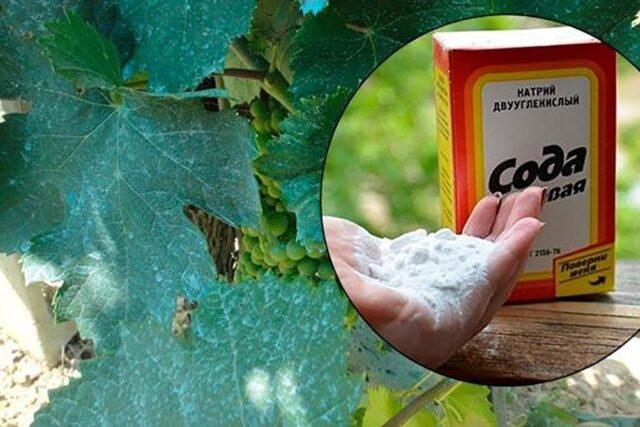
Soda treatment replaces a number of chemicals - this option is cost-effective, effective and safe
Methods for treating grapes with baking soda
Soda is a universal means for spraying grapes for different purposes. The dosage, addition of other components, and frequency of treatments depend on the reason for its use.
From powdery mildew
One of the large-scale problems when growing grapes is powdery mildew, also called oidium or oidium. Fungal spores overwinter, germinating in the spring, so preventative treatment begins early. There are several options:
- For 10 liters of water add 4 tbsp. l. soda, 40 g of soap - liquid or laundry solution.
- For 1 liter of water take 1 tbsp. l. sodium bicarbonate, twice as much vegetable oil, 0.2 liters of liquid soap. Treat the plantings with the resulting mixture from a spray bottle.
It is especially important to treat grapes with soda in the summer or in another season if damp weather has persisted for a long time.Such conditions contribute to the development of fungus and the spread of powdery mildew.
From gray rot
Another common fungal infection is gray rot. The problem affects different parts of the plant, including the fruit. Features of soda treatments depend on the scale of the disaster:
- for prevention or treatment in the early stages, dissolve 3 tbsp in 10 liters of water. l. sodium bicarbonate;
- in case of severe damage, add 2 tsp to 10 liters of water. soda, vegetable oil (¼ cup), soap solution (0.5 l).
You can supplement the recipe with 4-5 g of potassium permanganate. Be sure to wait until its crystals are completely dissolved.
For preventive purposes, you can use a soda-iodine complex. Add to 1 liter of water:
- soda – 1 tbsp. l.;
- iodine – 25 drops.
This composition is especially effective during the ripening period of grapes. Adding iodine will not only enhance the benefits of the solution, but will also strengthen the skin of the berries and improve its quality.
From mildew
Grape varieties that are not immune to this disease often suffer from mildew. If downy mildew is not overcome in a timely manner, it will gradually affect all parts of the plant. You can cope with the problem if you treat the grapes with soda and iodine. The proportions are as follows:
- 10-liter bucket with warm water;
- 0.3 kg sodium bicarbonate;
- 5 drops of iodine;
- liquid or laundry soap (pre-dissolve) for better adhesion.
Due to the safety of the ingredients used, it is possible to spray grapes with baking soda even while the berries are ripening. This will only have a positive effect on their taste.
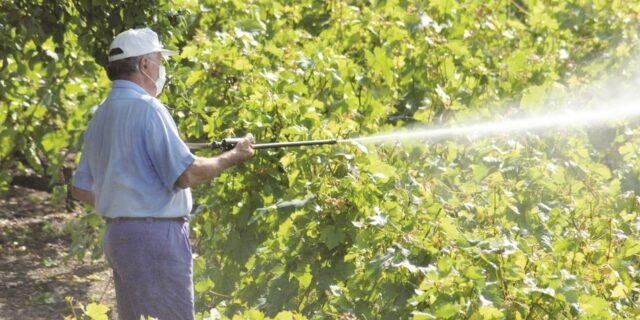
Detergents for soda treatments are taken without dyes and flavors
From pests
Among the enemies of grape plantings are caterpillars. Sodium bicarbonate and wheat flour help control pests. Take both products equally and dryly sprinkle the leaves with this composition. This option is not appropriate if the soil pH level is elevated. In this case, another composition will help:
- 10 liters of water (heat);
- 3 tbsp. l. soda;
- 60 ml of detergent composition.
To combat pests, adding tar soap is effective. It enhances the effect of the solution and creates the necessary protective film.
If the area is disturbed by aphids, mole crickets, ants or wireworms, it is effective to use the following mixture:
- 10 liters of water;
- 1 tsp. sodium bicarbonate;
- ½ tsp. ammonia;
- 1 tsp. Epsom salts.
If the grapes have suffered from weevils, it is effective not only to spray the bushes, but also to dip the tops of the shoots in water with the addition of 1 tsp. soda for 1 liter. It is on them that the accumulation of pests is most often observed.
When grapes ripen, there is a risk of wasp infestation. This mixture will save you from them:
- 1 liter of water;
- 10 g soda;
- ½ cup vinegar.
From weeds
For good development, grapes need to be weeded regularly, but sometimes weed growth is excessively active. You can solve the problem by spraying with soda solution. It is not the grapes themselves that need to be processed, but the weeds surrounding them. You don’t have to spray it, but just spill it.
This complex is also effective for weed control.
- 10 liters of water;
- 10 tbsp. l. soda;
- 1 tbsp. l. vegetable oil;
- a couple of drops of detergent.
The soil is sprayed or watered with this composition. Two applications per season are sufficient.
Like fertilizer
Soda solution is effective not only in the fight against diseases, pests and weeds, but also as a fertilizer. There are several options for using the product:
- To rejuvenate the culture, dissolve 1 tsp in a 10-liter bucket of water. soda and ½ tsp. ammonia. You need to spray the entire bush. The solution can be supplemented with 1 tsp. Epsom salts.
- It is effective to spray grapes with soda for sugar content. To prepare the solution, take 70 g of product per 10 liters of water.
- Another recipe is also effective for increasing sugar content - 10 liters of water, 5 tbsp. l. soda, 20 ml of liquid soap.
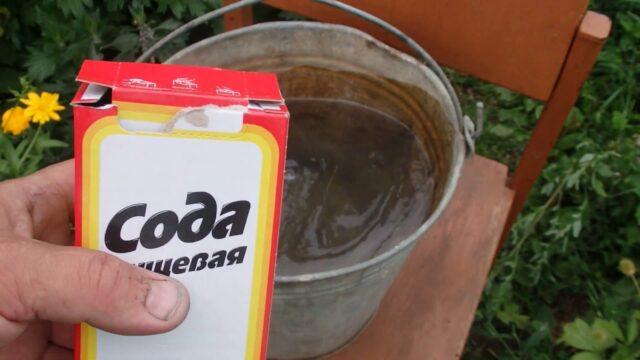
The spray solution should be prepared on the day of treatment and cannot be stored.
How to properly spray grapes with soda
Spraying grapes for treatment and prevention is not difficult. You should adhere to these rules:
- In summer, spray early in the morning or in the evening, when the sun has set.
- Process grapes in dry, windless weather. You should choose cloudy days for this.
- Spraying to prevent fungal diseases begins after the bushes open or on a swollen bud. Be sure to repeat the treatment before and after flowering, when coloring berries, on ripened fruits.
- Prevention of powdery mildew should begin three weeks before flowering. Spraying should be carried out at least once every five days.
- When treating powdery mildew, grapes are treated at least four times. A week interval is maintained between sprayings.
- To treat gray rot, treatment is repeated several times with an interval of 5-7 days.
- To increase the effectiveness of the soda solution, add other ingredients to it - iodine, potassium permanganate, Epsom salt.
- If soda sprays are necessary to treat diseases, then treatments are continued until the symptoms disappear completely. Then repeat several more times for prevention.
- You need to spray the grapes thoroughly, without skipping any areas. This is especially important when treatment is needed to treat or prevent diseases.
- If you use sprayers, it is important to prepare the solutions in a separate container and then pour them through gauze.
There is no specific consumption rate for soda solution for spraying grapes. You should spend enough of the prepared mixture on the crop to process all parts of the plant. Liquid consumption directly depends on the planting pattern, the height of the bushes, and their foliage.
Recommendations from gardeners
Many gardeners have appreciated spraying soda on grapes. Based on their experience, they make the following recommendations:
- When treating grapes with soda, it is necessary to control the pH level of the soil. This is especially important when the composition is used to water the ground to control pests or weeds. If the pH level is elevated, the dosage is reduced or the soda is replaced with other means.
- Dry weather is needed to process grapes, otherwise the solution will be washed away. If there is heavy rain after spraying, it is better to repeat the procedure. This will not harm the culture, but will maintain the desired effect.
- Spraying begins from the top of the bushes, moving downwards.
- During processing, be sure to take into account the direction of the wind.Otherwise, most of the solution may simply not reach the desired plants.
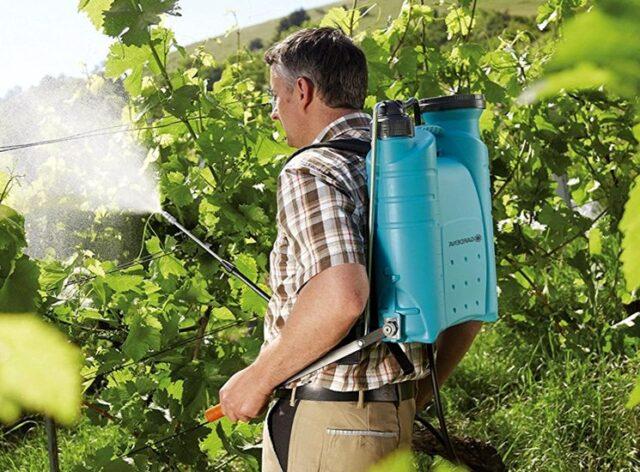
Soda solutions are safe for humans, so spraying does not require special clothing or other protective equipment.
Conclusion
Spraying grapes with baking soda is a universal option. Such treatments are carried out for the treatment and prevention of fungal diseases, pest and weed control, increasing the sugar content of fruits, and rejuvenating bushes. In addition to soda, other ingredients are added to spray solutions to increase the effectiveness of the product or create a protective film.
